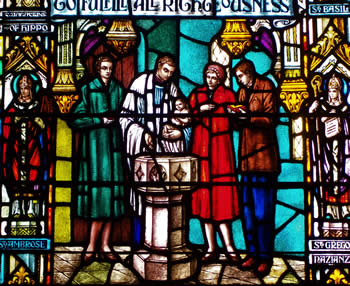Just after midnight, President Obama announced to the American public that Osama Bin Laden was dead. He gave a powerful and measured speech detailing a covert military operation into Pakistan. He began:
Tonight, I can report to the American people and to the world that the United States has conducted an operation that killed Osama bin Laden, the leader of al Qaeda, and a terrorist who’s responsible for the murder of thousands of innocent men, women, and children.
This is THE story dominating today’s “news cycle.” As a New Yorker, who vividly remembers the events of 9/11 and a Catholic moral theologian highly critical of the way the memory of 9/11 has been used to justify two wars, Guantanamo detention centers, and the deaths of thousands of civilians – I find myself perplexed and uneasy with what I am seeing.
On the one hand, I too feel a sense of relief. Was arresting and putting Bin Laden on trial ever really an option? I’d always assumed and attempt to capture him would result in a firefight. Was his covert existence “out there” a persistent threat to the United States and its citizens at home and abroad? Yes, I do believe he was. However, there is a difference relief and rejoicing. Retributive justice being done and a sense of profound relief is quite different from active rejoicing in the death of another.
As Christians, we are instructed in Matthew 5 to love our enemy. Beginning with St. Augustine, Just War Theory is predicated on the belief that it is somehow possible to love one’s enemy while killing them. Whether or not one agrees with Augustine and just war theory (on this I recommend the blog DatingGod for a pacifist’s response) – it seems clear to me that one cannot love one’s enemy while killing them AND rejoice in their death.
Vatican spokesman, Fr Lombardi released the following statement:
Osama bin Laden, as we all know, bore the most serious responsibility for spreading divisions and hatred among populations, causing the deaths of innumerable people, and manipulating religions for this purpose. In the face of a man’s death, a Christian never rejoices, but reflects on the serious responsibilities of each person before God and before men, and hopes and works so that every event may be the occasion for the further growth of peace and not of hatred.
People rejoicing in the streets at a man’s death, even if such a death can be argued to be justice just strikes me as unseemly. As a nation, shouldn’t we be concerned with global ramifications for parties in the streets? Is this not likely to incite retaliation, thus undermining the national security benefits just achieved? As Christians, shouldn’t we be more concerned with the Kingdom of God than temporal status?
Obama ended his speech:
Let us remember that we can do these things not just because of wealth or power, but because of who we are: one nation, under God, indivisible, with liberty and justice for all.
As Christians, it is appropriate to feel a strong sense of relief but not rejoice in the events of last night. It is imperative that we remain vigilant in questions of how American military might is being used; including, critically evaluating the justice and wisdom of the wars in Iraq and Afghanistan. But also, we must ask ourselves – in light of the Gospel – how do we strive to be “one nation, under God, indivisible, with liberty and justice for all” ? This, it seems to me, would call for more liberty and justice within our borders, within the world, and less rejoicing at the death of a man, no matter the evil he committed.





Well-stated, Meghan. I’m with you here. All along I, too, thought that even a surgical, more police-like operation to apprehend Bin Laden would probably involve a firefight (I doubted he would be taken without a fight). Like you, I am relieved and am not celebrating–and I have an Augustinian mournfulness that the whole thing ever had to be done. I worry, also, that the celebrations will be viewed by others, especially in the Middle East, much like how we view their celebrations in the streets when something bad happens to the US. In short, much of this smacks of the lex talionis approach of “eye for an eye” justice that unfortunately tends to perpetuate the cycle of violence. I really hope I’m wrong and that it won’t do so, but I worry.
In addition, here is a prayer my friend John Donaghy, who is in Honduras, wrote (expanding on the quote you provided from Vatican spokesperson Fr Federico Lombardi: http://networkedblogs.com/hlP2o
From my Methodist theologian friend Debra Dean Murphy (via Facebook): “In the Kingdom of God people rejoice when a lost soul is restored and reconciled; in the Empire that is America people rejoice when a lost soul meets a bloody, violent end.”
An James Martin SJ, who saw the effects of 9/11 first-hand, over at America magazine reminds us of what Pope John Paul II, who was not unfamiliar with terrorism and violence, taught about forgiveness: http://www.americamagazine.org/blog/entry.cfm?blog_id=2&entry_id=4174
I didn’t see your post before I put mine up, but I think we are in agreement. Prayer for one’s enemies, for Aquinas, need not preclude attacking one’s enemies if motivated by justice:
Good work, Beth! Here is also a short statement from evangelical Protestant ethicist David Gushee: http://www.newevangelicalpartnership.org/
To Beth: Great minds think aliked 🙂 I think the posts compliment each other nicely.
Tobias: Thanks for all your thoughts! Obviously we are in agreement. I too found Martin’s response insightful and dead on. One of the reasons I decided to post was that because I am not only from NY but a student at Fordham, living in the Bronx on 9/11/01. It has been my experience that whenever someone dislikes your interpretation to 9/11 – the initial response is “you don’t get it” and so I am always up front about my own experiences of that day. I will never forget the smell a week later – as the winds shifted and the smell of burning metal and flesh came northward to the Bronx. I do think this action can be examined both within AND outside the contexts of the 2 wars. I don’t necessarily think tis all 1 package deal – and my inclination so far is in agreement with the targeted action taken by the covert team. But that doesn’t mean you rejoice and party at death…. The challenge, as I see it, for Christians (and this points to Beth’s post) we can’t hold something is unforgivable. Desmond Tutu on this is great – pointing to belief in a savior, who at the point of a tortured death on a cross forgave.
Meghan, Yes, I think you and I are really on the same page on every point. Thanks again (and thanks to Beth, too). I’m so behind on grading papers, so it is good that the two of you took the time to reflect and write about this. In addition, here is a well-done piece by an undergraduate here at SLU who is going to BC this fall to do graduate study in theology: http://www.stltoday.com/lifestyles/faith-and-values/civil-religion/amelia-blanton/article_722be730-74cb-11e0-a70a-001a4bcf6878.html
Meghan, thank you for posting this. I had my morning class and my students were asking questions. They were sharing news of some of the celebrations that happened on campus last night. Even though I understand their reaction, I was uncomfortable with it. I wish I would have read this before going to class! The distinction you lay out between a sense of relief and joy is helpful. Thanks!
Meghan: thank for your wondeful post. (I’m sorry I clogged the site with yet another collection of thoughts!) Yes, I agree that your distinction between relief and joy is very helpful, and I completely welcome your censure of the latter. I would tend more toward the “pacifist” position in this case, I suppose, in that I feel deep unease not only with the vindictive rejoicing but ALSO with the manner of bin Laden’s death. (Thank you, by the way, for the DatingGod link.) I would feel vastly more relieved if bin Laden and his hateful and murderous vision had been relegated to history by the current uprisings in the Middle East than by a US special-ops bullet. The people do not want Islamism of his variety, and they are boldly and courageously saying so in the streets and squares, often under heavy fire. This growing hunger for liberty and participation could have (and I believe eventually will) overcome the backward-looking authoritarianism of al-Qaeda and those who wish to restore the caliphate. With bin Laden’s death, the question rises again: is violence the primary narrator of history?
Patrick – Thanks for your comment. I think its good we have multiple voices on this – seeing the similarities and differences is important! I fully grant – how close to pacifism one comes is at work here – but I don’t quite agree/understand what you would’ve preferred to see happen to Bin Laden? The Egyptian and other revolutions can unseed Al- Qaeda; but, I guess I don’t see that as the only issue at stake in Bin Laden. Future threat/unrest is very much dependent on that and yes, I agree with you I would have liked to see an irrelevant Bin Laden! However, I do not think that would be enough – he committed numerous crimes for which he should be held accountable. This is why I think how he was killed is likely the best option there was – as I do not believe that arresting Bin Laden was ever practically possible. I cannot imagine a situation in which an arrest is plausibly attempted without Bin Laden and his men fighting back – as we now know, there was a firefight here. Like you, I am concerned with future violence and his influence being removed; but I don’t have a problem with the manner of his death. (I am of course limiting my comments to this particular special ops situation – I understand those who wish to frame this within the Afghanistan and Iraq wars, which is a separate conversation entirely).
Wonderful posts. I think the quote “In the face of a man’s death, the Christian never rejoices” captures the matter extremely well. What is bothersome is the rejoicing, not the sense of justice done. I sometimes wonder if our temptation to reduce politics and economics to “winning and losing” – sports – leads us in mistaken directions, or whether the deeper problem really is a sense of real vengenace that is truly incompatible with following Christ.
I want to thank you all for sharing your thoughts and comments on this issue. When I awoke this morning to see the headlines in the Washington Post and Wall Street Journal and status updates on Facebook, I had nothing but the feeling of unease at the celebratory mood of people on this issue.
I think more than anything bin Laden had become this special figurehead of a movement of terrorism against the United States, and such an action against him represents this cause for celebration (in so far as its a bolster for the identity of the United States).
However, my unease today has given way to disappointment this afternoon, in a way, more about the current political and social climate that exists in the United States and how the US collectively feels its needs to be vindicated when wrong doings occur. With the death of bin Laden, has peace been promoted or ensured? What has the whole war on terror done in the end? Has peace been the effort? Or is it more about security and safety?
I’m reminded of a speech Dietrich Bonhoeffer gave in Fano in 1934 concerning some of these same themes. In that speech he said, “There is no way to peace along the way of safety. For peace must be dared. It is the great venture. It can never be safe. Peace is the opposite of security. To demand guarantees is to mistrust and this mistrust in turn brings forth war. To look for guarantees is to want to protect oneself. Peace means to give oneself altogether to the law of God, wanting no security, but in faith and obedience laying the destiny of the nations in the hands of Almighty God, not trying to direct it for selfish purposes. Battles are won, not with weapons, but with God. They are won where the way leads to the Cross.” (See A Testament to Freedom: the essential writings of Dietrich Bonhoeffer, p. 228)
Where does all this lead us, Christians living in this country and world? I think Bonhoeffer is right. If we are trying to find safety and security as ways of peace, then we will never have such peace. But if we put our trust in God and live out our Christian lives in that relationship with God and others, then we will find a peace that this world can never give and a safety and security that this world will never give. This kind of attitude carries with it a host of commitments, some I am comfortable with and some I am not. I guess that means how much more I need to grow in my trust in God.
Great post, Meghan, followed by great responses. I am reminded of Augustine’s comments in “The City of God” about the judge who must issue a sentence of death, even in the face of uncertainty about the person’s guilt. There he writes that
“If then, such darkness shrouds social life will the wise judge take his seat on the bench? That he will. For human society, which he cannot rightly abandon, constrains him to do his duty. He will take his seat and cry ‘From my necessities Thou deliver me’ (Psalm 25:7)” (De Civ Dei, XIX: 6).
The same could be said of a soldier in a just war. I agree that even a just death elicits mourning, rather than jubilation, and any solidarity is best expressed in common mourning – over the loss of life caused by bin Laden and others, and the need to respond with vengeance.
“For I have no pleasure in the death of anyone, says the Lord God. Turn, then, and live” (Ezekiel 18: 32).
Great post, Meghan. And I’ve enjoyed reading the comment thread too. I’ve had so many questions today when I was thinking about this. Was this operation legal? Was BL given safe haven by the Pakistani military all these years? How has this been received abroad, and how has it been reported by Al Jezeera? Will there be a backlash? Who will lead AlQ now? How will the U.S. continue to cooperate with Pakistan on operations in Afghanistan, given the inevitable loss of trust? Did the CIA engage in torture in order to secure actionable intelligence? And on and on… There is so much that citizens simply do not know about these kinds of operations. So it is hard for me to have moral clarity about any of this right now. Like you, I’ll keep reading and keep assessing as we have more information. But thanks for jumping in with such a thoughtful piece.
To the question: is violence the primary narrator of history? I will reply no. The final narrative in human history will be that of love. This will be the final victory over sin and death by Christ when all things are made anew. In the present unfortunately, violence is prevalent in different ways; sometimes justly but more often, unjustly.
Thanks Emily! I agree – there is so much we don’t know and won’t know about such things…I share your questions. I agree it is difficult to have moral clarity right now – What I think also complicates things even more is that I don’t think even President Obama when making his decision necessarily knew for certain all the relevant answers…..we keep asking questions and be open.
I’m so glad so many people got involved in today’s discussion!
Here’s my 2 cents I was asked to write over at Christian Century: http://www.christiancentury.org/article/2011-05/justice-or-vengeance